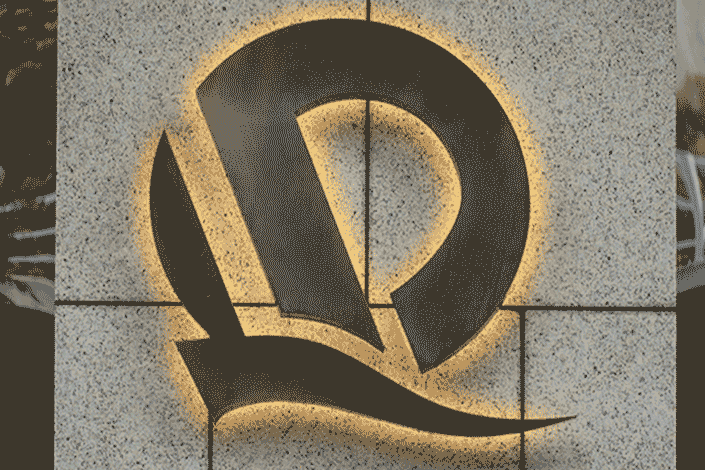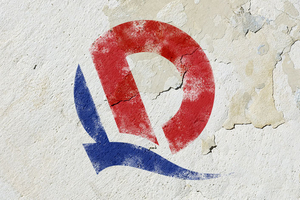In Depth: How Evergrande’s Founder Played the Capital Markets

Cash-strapped China Evergrande Group (03333.HK) was once skilled at charming the capital market.
Since it went public in 2009, Evergrande, whose main business is real estate development, has had four major subsidiaries listed in Hong Kong. Over that time, Evergrande has often employed tactics to generate hype in the capital market to push up its valuation. Although this was an open secret, Evergrande’s stock price kept going up.
As China’s housing market cooled in recent years, along with the government’s roll-out of the “three red line” policy — which put a 70% ceiling on developers’ liability-to asset ratios, a 100% cap on net debt-to-equity ratios and required developers to have enough cash on hand to cover short-term liabilities, Evergrande’s financial market savvy was no longer enough to divert attention from its mounting operating costs and debt. The company’s total liabilities now stand at nearly 2 trillion yuan ($300 billion). The severity of what Evergrande now faces — a liquidity crisis that could spark a severe systematic problem that takes years to resolve — remains unknown. Nevertheless, shares of its Hong Kong-listed units have suffered heavy losses. Some 90% of Evergrande’s once HK$1 trillion ($128.4 billion) market valuation has evaporated.
Evergrande is a big issuer of bonds — both the onshore and offshore variety. Its major property development subsidiary, Hengda Real Estate Group Co. Ltd., has 53.5 billion yuan worth of outstanding onshore bonds, with an average coupon rate of 6.35%. It has also issued 2.4 billion yuan in asset-backed securities, surpassing most rivals in terms of both the amount of the debt issued and the interest the company must pay on it. As one of the domestic real estate industry’s largest offshore bond issuers, Evergrande has about $19.3 billion in U.S. dollar bonds outstanding, with the debt carrying an average coupon rate of 10.6%, according to figures compiled by data provider Financial China Information & Technology Co. Ltd.
Over the past few years, Hong Kong-listed Evergrande has issued a large amount of high-yield offshore debt on a rolling basis, with a considerable portion being bought and held by Evergrande’s founder Hui Ka Yan (许家印), whose name is Xu Jiayin in Mandarin.
Some challenged the maneuver and questioned whether it was meant to convert the 61-year-old Hui’s onshore yuan assets to offshore ones. Through company dividends, Evergrande’s yuan assets were transferred to Hong Kong dollar assets of major shareholders, who then used the money to purchase U.S. dollar bonds issued by the company.
When the cracks appeared
In September 2016, Evergrande launched a reorganization plan with Shenzhen Special Economic Zone Real Estate & Properties (Group) Co. Ltd. (000029.SZ), aiming to complete a back-door listing on the A-share market. To this end, Evergrande brought in strategic investors in three rounds — one in late December 2016, one in late May 2017 and one in November 2017 — raising 130 billion yuan in total. The funds were used to repay about 120 billion yuan in outstanding perpetual bonds in an effort to reduce its interest payment burden.
To attract those investors, Evergrande offered a very generous valuation adjustment mechanism (VAM). It promised that its annual net profits from 2017 to 2020 would be no less than 24.3 billion yuan, 50 billion yuan, 55 billion yuan and 60 billion yuan respectively, with at least 68% distributed to shareholders each year. Given the fact that Evergrande’s cash flows were negative, achieving the promised profitability was difficult.
Evergrande’s plan to return to the high-valuation A-share market eventually failed in September 2020. Hui managed to convert the 130 billion yuan of the strategic investment into ordinary shares, which were classified as equity but had debt-like features. Over the prior three years, Evergrande reported a net profit of 37 billion yuan in 2017, a record-high profit of 77.21 billion yuan in 2018 and 33.5 billion yuan in 2019. In 2020, the cracks started to appear as the company’s core operations suffered heavy losses; however, Evergrande still managed to report a net profit of 10.5 billion yuan by selling off assets.
Investors have long had questions about Evergrande’s high profit numbers and its capital market maneuvering.
To start with, the company’s core real estate business did not take in as much in advance payments for pre-sold properties as its peers. And even in good years, it did not have enough cash on hand to cover its short-term liabilities.
Other Chinese real estate giants, like China Vanke Co. Ltd. (000002.SH) and Country Garden Holdings Co. Ltd. (02007.HK), usually hold enough cash to meet their short-term liabilities. They also take in enough advance payments to cover the trade payables they owe to their suppliers.
Moreover, Evergrande hid tens of billions of interest expenses every year through its aggressive interest expense capitalization arrangements. “Capitalization of interest” is a common practice in Chinese real estate companies, through which interest payments are treated as part of a fixed asset rather than an expense. Evergrande used the method to the extreme. Between 2017 and 2020, Evergrande capitalized 45 billion yuan, 59.9 billion yuan, 50.9 billion yuan and 69.4 billion yuan of its interest each year, driving the total to 169.7 billion yuan in 2020. Evergrande put these figures under the category of “properties under development.” Evergrande’s capitalized interest, in terms of both absolute scale and proportion of its revenue, was much greater than that of other leading companies in the real estate business.
These aggressive moves seriously distorted Evergrande’s financial statements over the years.
Dividend diversion
With the inflated profits came high dividends, which Evergrande has paid out annually. It managed to maintain a dividend payout ratio of 50%, much higher than that of other Chinese real estate giants such as Country Garden, Vanke, Poly Real Estate Co. Ltd. and Sunac China Holdings Ltd., whose dividends are mostly between 20% and 30%.
For Evergrande’s fat dividends, Hui and his family member were the biggest beneficiaries.
As of June 2021, Evergrande’s total share capital was 13.2 billion shares. Hui, his spouse Ding Yumei, and their relatives, held 10.16 billion of those shares, representing 76.7% of the total. Based on Evergrande’s shareholding structure, some 53 billion yuan of the 69.2 billion yuan in dividends that the company had paid had been distributed to Hui, his wife, and their relatives.
Receiving dividends was only the first step. Hui has been one of the major buyers of Evergrande’s high-yield offshore U.S. dollar bonds. For example, in October 2018, Evergrande issued $1.8 billion worth of senior debt in three tranches — $565 million in 11% bonds due in 2020, $645 million in 13% bonds due in 2022 and $590 million in 13.75% bonds due 2023. When it was issued, the 2023 bond set a new yield record for junk bonds issued in Asia that year, according to data compiled by Bloomberg.
Along with his offshore company, Xin Xin (BVI) Ltd., Hui bought $1 billion of the 13% and 13.75% bonds, amounting to 80% of those two tranches.
With Evergrande teetering on collapse, one investor in Evergrande’s new-energy vehicle unit lamented rushing through the deal. “We didn’t have time to negotiate any collateral or guarantee,” he said. “How I regret it now.”
Guo Yingzhe contributed to this report.
Contact editor Michael Bellart (michaelbellart@caixin.com)
Download our app to receive breaking news alerts and read the news on the go.
Get our weekly free Must-Read newsletter.

- PODCAST
- MOST POPULAR






